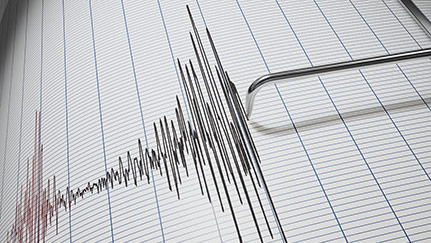Could it happen?

How often do we reflect on the impact an earthquake would have? The number of people exposed to potentially damaging earthquakes is staggering. The U.S. Geological Survey estimates that nearly half of all Americans are at some risk for damaging earthquakes.1 Why aren't more people purchasing earthquake insurance?
- They don’t think an earthquake would impact them.
- They mistakenly believe earthquake insurance is covered by homeowners insurance.
- They believe there will be federal disaster assistance.
- They think the deductible is too high.
- It costs too much.
Standard homeowners, renters and condo insurance policies do not cover damage from earthquakes. Federal disaster assistance can be very helpful for temporary housing and emergency repairs, but it probably won’t be enough to fully repair earthquake damages. Earthquake coverage is available in the form of an endorsement or as a separate policy. Earthquake insurance provides protection from the shaking and cracking that can destroy buildings and personal possessions. Coverage for other damage that may result from earthquakes, such as fire or water damage, is generally provided under the homeowners policy.
Purchasing earthquake insurance
Earthquakes are a real possibility. Think about getting earthquake insurance if you don’t already have it. Below is a summary of earthquake coverage you may want to look into.
| Coverage | Earthquake coverage offerings |
|---|---|
| Deductible | Wide range of deductible options, including 5%, 10%, 15%, 20% and 25%.2 This applies to the total amount of loss incurred. |
| Dwelling | Extends the coverage A — dwelling to include earthquake as direct physical cause of loss. |
| Personal property | Includes coverage for a direct physical loss to property under coverage C — personal property. |
| Loss assessment | Loss assessment is a separate endorsement, available if Earthquake Endorsement has been purchased. Provides protection for condo owners on claims involving the building, its common areas and possibly the building's exterior or property. Extends loss assessment coverage to include earthquakes as a cause of loss. |
| Other structures | With the homeowners protection endorsement, structures other than the home are also covered for earthquake damage. |
| Additional details | Earthquake coverage offerings are not available in every state and do not apply to California. |
Choosing a higher deductible, retrofitting your home or installing a seismic shut off valve may help lower the cost of earthquake insurance. Generally speaking, the larger the earthquake deductible, the less you will pay in premium. Retrofitting strengthens the structural integrity of a home to better withstand the various seismic forces that occur during an earthquake. Examples of retrofitting include foundation bolting, cripple wall bracing, hold-down brackets and soft-story modifications. A seismic shutoff valve will close gas lines in the event of an earthquake, helping to prevent further loss from a fire caused by a ruptured gas line.
Nationwide Private Client provides an insurance solution for earthquakes through endorsements including our earthquake, earthquake loss assessment, and home protection endorsement in all states except California. The coverage does not increase the limits of liability stated in the homeowners policy. Nationwide Private Client has also established a relationship with the California Earthquake Authority (CEA) to provide alternative solutions for earthquake coverage in California. Earthquakes can happen — contact your agent for coverage options.
Why it’s important for you
Affluent clients’ home insurance needs are typically not met by most mass-market carriers. At Nationwide Private Client, we’ve customized our policies with the affluent individual in mind. We pride ourselves in being a key solution before problems arise.
Nationwide Private Client offers these added benefits:
- Specialized claims service: Our team of problem-solvers is available 24 hours a day, 365 days a year.
[1] usgs.gov/news/featured-story/nearly-half-americans-exposed-potentially-damaging-earthquakes
[2] Subject to underwriting eligibility.